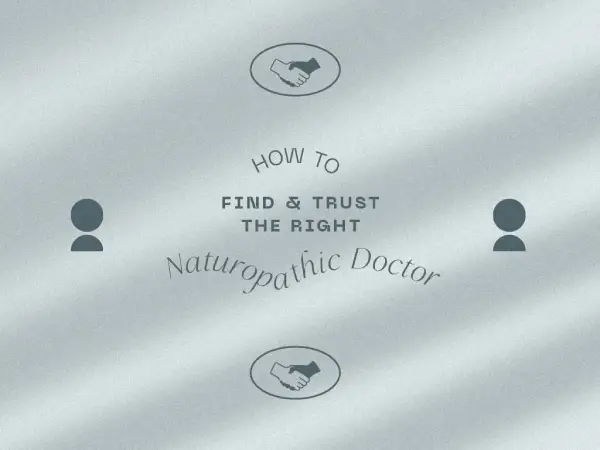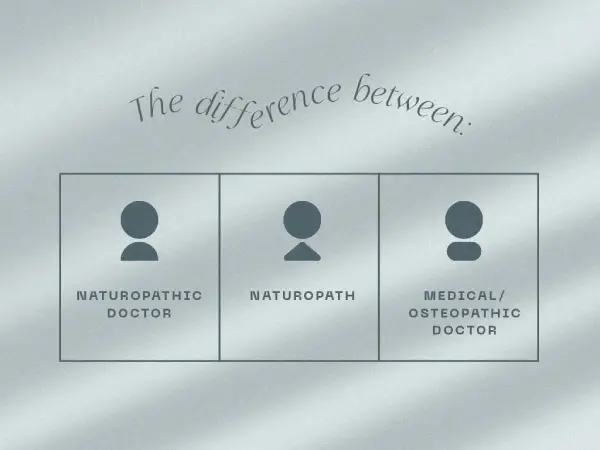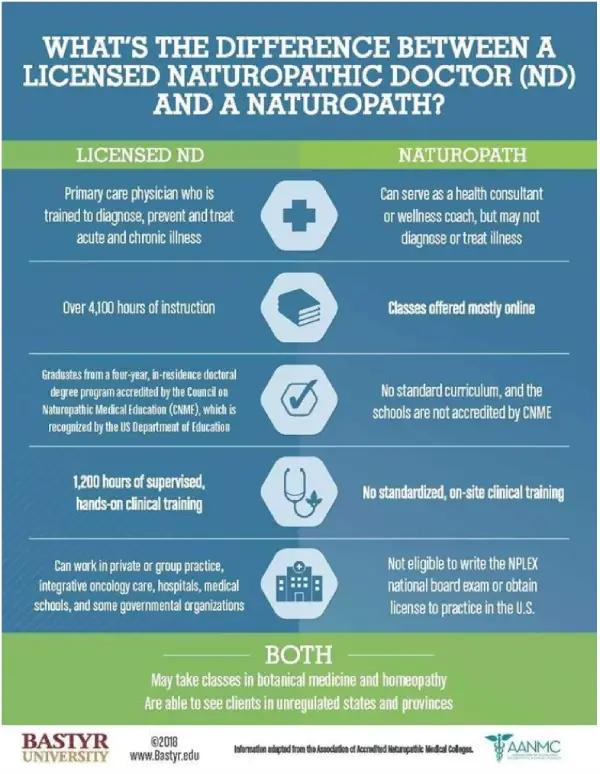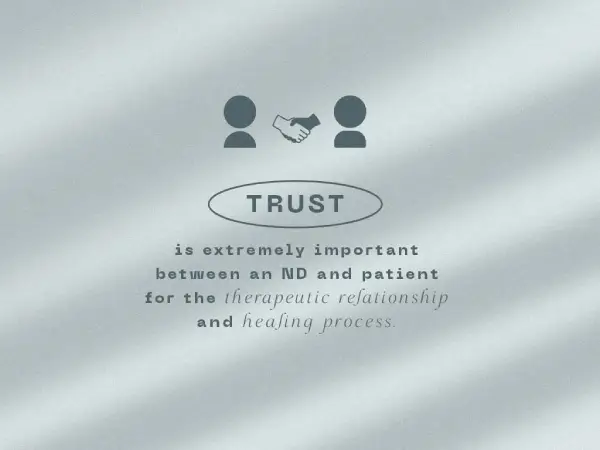Blog
How to Find and Trust the Right Naturopathic Doctor

There are a few important considerations to keep in mind when looking for and working with a naturopathic doctor. With all the different programs and titles out there, it is easy to become confused or misled – this guide is here to help prevent this from happening so that you can find the competent naturopathic doctor (ND) that’s right for you! Let’s start by understanding what it means to be an ND and what it takes to become one, and then learn how to recognize a good one and how to go about finding one!
Naturopathic Doctor vs Naturopath vs Medical/Osteopathic Doctor
First, let’s talk about the difference between a Naturopathic Doctor (ND) and a naturopath because the two are not the same. Unlike naturopaths, NDs are qualified doctors who are trained to medically diagnose and prescribe. Differentiating the two titles can be difficult because naturopaths can call themselves NDs in certain states where naturopathic medicine is not yet a regulated medical profession. Here is an infographic from AANMC that highlights the differences between NDs and naturopaths:
Naturopathic doctors (ND), Medical Doctors (MD), and Osteopathic Doctors (DO) are all qualified physicians who are trained to medically diagnose and prescribe. The major differences between an ND and an MD/DO is in their medical education and practice philosophy. MDs/DOs are trained by the conventional model of healthcare. Naturopathic medicine combines both the wisdom of nature and ancient medicine with modern science and research. MDs/DOs are experts in trauma, diagnostic medicine, surgery, and acute health care. DOs training focuses on a whole-person approach with emphasis on the musculoskeletal system to provide comprehensive manipulative treatment.
NDs are trained as general practitioners who can treat minor acute health conditions and offer a very diverse therapeutic toolbox for those with chronic diseases/disorders. NDs can receive additional training to become a specialist in a certain area(s) or they refer to specialists as necessary. NDs, MDs, and DOs all complete a 4-year medical program accredited by the Federal government, however, only MDs and DOs are required to complete a residency in their chosen specialty. The type of coursework and number of hours spent for each differs between the two types of healthcare. NDs typically work in outpatient clinical settings (like wellness centers) whereas MDs and DOs typically work in inpatient clinical settings (like hospitals).
The Journey to Becoming a Naturopathic Doctor (in the US and Canada)
- Attain a Bachelor’s degree – Required
- A bachelor’s degree is required for application to an accredited naturopathic medical school. Prerequisite courses may be needed if they were not completed as part of a bachelor’s degree (for e.g., for those without a bachelor’s degree in science).
- Complete a 4-year professional naturopathic doctoral program – Required
- The program must be accredited by the Council on Naturopathic Medical Education (CNME), which is recognized as an accrediting body by the U.S. Department of Education and is the only accrediting body for naturopathic medical programs in the US and Canada that qualifies graduates for licensure.
- CNME accredited naturopathic schools include Bastyr University, Canadian College of Naturopathic Medicine, National University of Health Sciences, National University of Natural Medicine, and Southwest College of Naturopathic Medicine & Health Sciences. Online and correspondence naturopathic doctor degree or certificate programs do not have CNME accreditation or standardized curriculum.
- The program consists of 4,100+ contact hours of instruction including 1,200 hours of supervised, hands-on clinical training. The curriculum is made up of biomedical sciences, clinical sciences, and natural therapies. Specialized classes (such as oncology, pediatrics, geriatrics, IV/injections/minor surgery) and electives are also completed. Some schools offer a co-degree in acupuncture or midwifery.
- Pass the two-part national board exam (Naturopathic Physicians Licensing Exam) – Required
- This exam (AKA NPLEX) consists of biomedical science and clinical medicine components. The first exam taken is typically taken after the first 2 years of the program and the second exam is taken after graduation. Passing both exams is mandatory for licensure.
- Become licensed in the state of practice – Required
- NDs must be licensed to practice in the state(s) where they work. Currently, NDs are regulated in 22 states and 5 provinces, as well as the District of Columbia, U.S. Virgin Islands, and Puerto Rico.
- The scope of practice will vary from state to state – in certain states, NDs may be eligible to perform grade 5 physical manipulation, minor surgery, childbirth, pharmaceutical prescription, and more!
- To see a map of all licensed states, visit the following link: https://naturopathic.org/page/RegulatedStates#
- Complete a post-doctoral residency – Optional
- A residency can be done through a variety of verified health care facilities. It is up to the ND if he or she wants to begin a residency after graduation or dive directly into practice.
- Keep up with continuing education – Required
- NDs must continue medical education after graduation by completing yearly medical education courses to maintain licensure. Additionally, there are tons of trainings and certifications that NDs can attain for further specialization.
The Qualities of a Good Naturopathic Doctor
All NDs are trained to perform a comprehensive patient intake with physical examination, order lab work and other diagnostic or functional testing, make a diagnosis, and create a treatment plan with appropriate monitoring and evaluation. However, not all naturopathic doctors are created equal – even if they have completed all the requirements for becoming a legitimately qualified ND, they must possess certain qualities that make them a genuinely good ND. Finding a naturopathic doctor that fits your personality and meets your needs might take some shopping around. Regardless, it is important that all NDs are competent, transparent, respectful, and compassionate. Use your knowledge and intuition to identify these qualities in your ND. Trust is extremely important between an ND and patient for the therapeutic relationship and healing process. Here are some questions to ask yourself when thinking about the nature of your ND:
Do I have a thorough understanding of my health condition and treatment plan?
Do I always get all my questions and concerns addressed during appointments?
Do I feel comfortable, valued, and well taken care of by my naturopathic doctor?
Does my naturopathic doctor have all the documentation available to back up his or her title? (e.g., degree, license, NPI number)
Is my naturopathic doctor making efforts to continually broaden his or her knowledge?
Have I experienced an improvement in my health over time while working with my ND?
The answer to all these questions should be yes. If they are not, you may want to discuss your unmet needs with your ND or consider finding another ND to take over your care.
How to Find a Naturopathic Doctor
Although naturopathic medicine continues to grow and expand, NDs may not always be easy to find. When it comes to searching for an ND, you might consider the following options:
- Booking an appointment with one of our amazing NDs at LIVV!
- Asking your health practitioner(s) to refer you to a naturopathic doctor
- Taking your friend’s word for it – sometimes you find the best NDs by word of mouth
- Exploring and following NDs on social media platforms such as Instagram
- Checking out the reviews about a particular ND on their website or Yelp
- Use an online database:
- https://naturopathic.org/search/custom.asp?id=5613
- https://www.ifm.org/find-a-practitioner/
- www.google.com (“naturopathic doctors near me”)
Written by Jordan Valdez, RDN
References
https://aanmc.org/naturopathic-schools/
https://aanmc.org/comparing-nd-md-curricula/
https://www.fortcollins-naturalmedicine.com/nd-and-md-comparison.html



